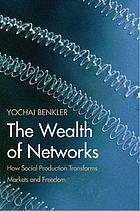
The Wealth of Networks
How Social Production Transforms Markets and Freedom
کتاب های مرتبط
- اطلاعات
- نقد و بررسی
- دیدگاه کاربران
نقد و بررسی

May 1, 2006
In this thick academic book, Yale law professor Benkler offers a comprehensive catalog of flashpoints in the conflict between old and new information creators. In Benkler's view, the new "networked information economy" allows individuals and groups to be more productive than profit-seeking ventures. New types of collaboration, such as Wikipedia or SETI@Home, "offer defined improvements in autonomy, democratic discourse, cultural creation, and justice"-as long as government regulation aimed at protecting old-school information monoliths (such as the Digital Millennium Copyright Act) doesn't succeed. Non-market innovation is a good thing in itself and doesn't even have to threaten entrenched interests, Benkler argues; rather, "social production" can use resources that the industrial information economy leaves behind. Where Benkler excels is in bringing together disparate strands of the new information economy, from the democratization of the newsmedia via blogs to the online effort publicizing weaknesses in Diebold voting machines. Though Benkler doesn't really present any new ideas here, and sometimes draws simplistic distinctions, his defense of the Internet's power to enrich people's lives is often stirring.

May 1, 2006
In this thick academic book, Yale law professor Benkler offers a comprehensive catalog of flashpoints in the conflict between old and new information creators. In Benkler's view, the new "networked information economy" allows individuals and groups to be more productive than profit-seeking ventures. New types of collaboration, such as Wikipedia or SETI@Home, "offer defined improvements in autonomy, democratic discourse, cultural creation, and justice"-as long as government regulation aimed at protecting old-school information monoliths (such as the Digital Millennium Copyright Act) doesn't succeed. Non-market innovation is a good thing in itself and doesn't even have to threaten entrenched interests, Benkler argues; rather, "social production" can use resources that the industrial information economy leaves behind. Where Benkler excels is in bringing together disparate strands of the new information economy, from the democratization of the newsmedia via blogs to the online effort publicizing weaknesses in Diebold voting machines. Though Benkler doesn't really present any new ideas here, and sometimes draws simplistic distinctions, his defense of the Internet's power to enrich people's lives is often stirring.
Copyright 2006 Library Journal, LLC Used with permission.

























دیدگاه کاربران